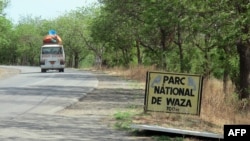Cameroon’s military took over the construction of roads at its northern borders with Chad and Nigeria after Chinese contractors abandoned the work following repeated attacks from armed Boko Haram fighters.
Hundreds of curious onlookers, including businesswoman and politician Amkress Djibrine, watched Cameroon's military engineering corps dig through an abandoned portion of the road linking its northern border town of Kousseri to the Chadian capital Ndjamena and Borno state in north eastern Nigeria.
Djibrine says they are very happy because when construction work is complete, travel times will be reduced as much as 75 percent.
The work, which started on March 1 with the portion linking Mora-Dabanga and Kousseri in Cameroon, was interrupted in 2014 following an assault on the base camp of Chinese road contractors.
The Chinese workers abandoned the road and mining exploration sites in northern Cameroon when 10 of their workers were kidnapped from a camp in Waza by suspected Boko Haram rebels.
The kidnappers also stole 10 vehicles and a container of explosives.
The captives were released in October along with 17 other hostages and the wife of Cameroon Vice-Prime Minister Ahmadou Ali.
Cameroon public works minister Emmanuel Nganou Djoumessi says since then, they found it impossible to convince the Chinese to go back to work and called on the military engineers.
"This stretch of road would have been already entirely constructed if we did not face this very, very painful situation orchestrated by Boko Haram," he said. "We have been working with the World Bank, the financing is available."
Djoumessi says the World Bank provided about $125 million for the project to be completed in 24 months.
World Bank Cameroon representative Elisabeth Huybens says the 212 kilometer stretch of road is a key to commerce between Cameroon, Nigeria, and Chad.
"The mission of the World Bank is to eliminate extreme poverty in the world, and here in Cameroon when we talk about poverty much of it is actually located in the northern regions and especially in the far north," she said.
Cameroon, Nigeria, Chad and Niger soldiers under the multi-national joint task force of the lake Chad Basin Commission rolled back Boko Haram gains since last year and announced the terrorist group was living its last moments, but the insurgency switched to terror attacks and remains a threat.
The conflict that began in northeast Nigeria eight years ago has left at least 25,000 people dead and forced more than 2.6 million others to flee their homes, according to the United Nations.




